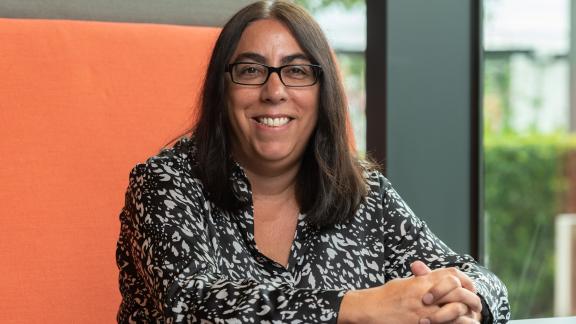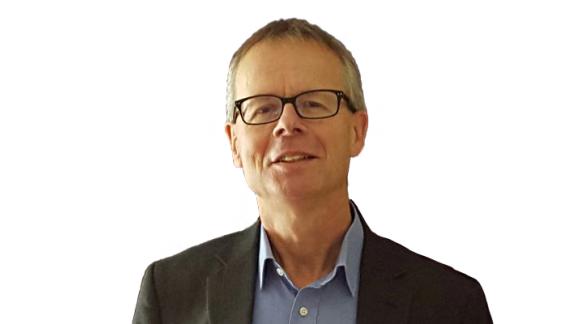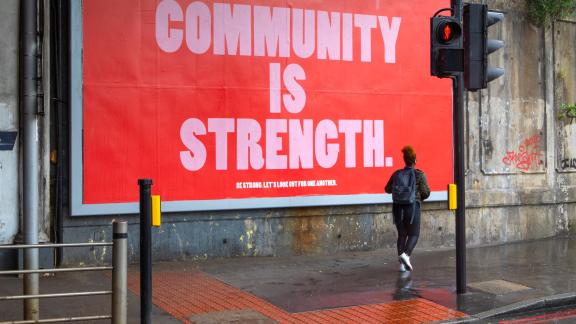The NHS is not alone this winter

Across England, local community organisations and volunteers can play their part again in helping health and social care services keep people safe this winter.
In 2020, as COVID-19 spread across the country, the NHS faced the most significant challenge in its history. Two years on, and with little respite, health and social care services prepare for what some think will be the most brutal winter on record.
But, if there is one thing the pandemic showed, the NHS will not be alone.
An ideal partner
Community organisations are an ideal partner for the NHS. They are small enough to be highly flexible and agile in how they can respond. They have deep links into communities to which health and care organisations struggle to speak. Local people trust them, and they can mobilise significant support. And the imagination and ingenuity of the sector are second to none.
NHS and third-sector leaders must ask themselves, how can we work together this winter?
However, if the NHS is to harness this resource, the sector must start involving communities in its plans. And NHS and third-sector leaders must ask themselves, how can we work together this winter?
This issue is one I recently discussed with local Healthwatch leaders. How can we refocus our existing work and free up any spare capacity to support an NHS system already facing a massive backlog of care, workforce problems and access issues in nearly every area?
Helping the NHS to spot issues
NHS England's announcement that 'war rooms' will be set up in every area to track capacity in hospitals and care homes underlines the critical role intelligence plays in managing a crisis.
With integrated care systems focused on delivering their winter plans, we aim to help by monitoring their impact and rapidly feeding back what we hear in critical areas
Healthwatch, nationally and locally, already helps NHS and social care decision-makers hear what is working and what is not from the public's perspective. For example, Healthwatch Surrey issues a regular bulletin to help their NHS understand what patients say about care. It not only flags new concerns but also highlights services that, despite the pressure they face, are providing a good service.
However, this winter, we'll be doing more. With integrated care systems focused on delivering their winter plans, we aim to help by monitoring their impact and rapidly feeding back what we hear in critical areas, such as virtual ward performance, treatment backlogs and access to primary care.
In partnership with the Care Quality Commission, we'll also be running a campaign to encourage the public to play their part by giving feedback on care. A drive that I would encourage NHS services and charities to join.
Using advice to reduce pressure
Community organisations already do a fantastic job in helping the public with advice or signposting them to services that can help. But can we do more by working in partnership?
Healthwatch, like many others, is already helping amplify NHS messages, whether encouraging people to get vaccinated, take steps to stay well this winter or use services such as pharmacies to take the pressure off other care areas.
But by forming partnerships, organisations can do further. For example, in Rochdale, community and faith organisations teamed up with statutory partners and local care providers during the pandemic to ensure consistent communications within the borough.
While in County Durham, a partnership handles advice and signposting requests collectively. Taking a 'no wrong door’ approach, when someone contacts an organisation that isn't best placed to help, they take the query. They then activate the partnership to ensure that someone from the correct organisation gets in touch to help.
These straightforward approaches not only benefit the public but also can help divert queries away from GPs and other professionals who already have their hands full.
Maximising the skills of the third sector
The recent Care Quality Commission’s State of Care report highlighted that health and care staff want to provide good, safe care, but struggle to do so in a gridlocked system.
…local leaders must consider what role community groups play and how the NHS can harness their unique strengths
When it comes to removing blockages in care this winter, the needs of every NHS area will be different. Therefore, local leaders must consider what role community groups play and how the NHS can harness their unique strengths.
For example, when the NHS in East Sussex wanted to better support patients discharged from the hospital and prevent emergency readmissions, it made sense to talk to their local Healthwatch.
With a pool of volunteers and a track record of providing advice, Healthwatch Brighton and Hove quickly set up a service that checked on the wellbeing of those discharged, flagging any issues with the hospital and supporting patients to access other services in the community.
Together we can
There is little doubt that this winter will be hard, and that the NHS will face challenges on nearly every front. But you do not have to meet this challenge alone.
With openness, imagination and the same spirit we showed during the pandemic, a partnership between the NHS and their communities could make all the difference.
Louise Ansari is national director of Healthwatch England. You can follow Healthwatch England on Twitter @healthwatche



